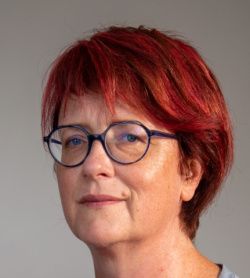Anke Lohmann
 Founder and Chair of Anchored In Ltd and Chair of the QuantIC Market Opportunities Panel
Founder and Chair of Anchored In Ltd and Chair of the QuantIC Market Opportunities Panel
What does it mean to be a woman in STEM?
I am an engineer, following my mother’s footsteps. At school, I loved physics and mathematics. Basically, I love solving puzzles, even better if they are about real-life problems. So, choosing a career in engineering was a natural decision for me. Having my mother as a role model helped. However, when I was a student, I realised how few women went into engineering. We were less than 4 % in my cohort of 500 students enrolled in electrical/electronics engineering at my university over 30 years ago. This meant that people remember you even if you don’t remember them. People talk about being disadvantaged or working harder to get recognition as a woman. That is not my experience. I have not encountered much prejudice but a lot of encouragement. And I have noticed that female engineers tend to be very good. I feel proud to be one of them.
Why is gender equality important in STEM?
Having a diverse group of people going into STEM is essential for several reasons. People in these subject areas tend to develop new technologies and, thus, products. Considering how different groups of people use products and how it impacts them is essential, and it requires a diverse group in the development team. Also, considering scientific discovery’s impact on different parts of society will benefit from the insight of a broad group of people. And finally, for people who love STEM subjects, having role models to follow will make it a lot easier for them to choose a STEM career, even though, culturally, it may be viewed as an atypical career choice. Unfortunately, I have met women who regretted not following a STEM career because their teachers for example, discouraged them.
What interested you in quantum?
I was interested in integrated photonics, so I joined my colleagues from Innovate UK on a visit to Bristol University. The academics invited us to showcase their solutions based on photonic integrated circuits for quantum technology applications such as secure communication and computing. Since I understood what was explained to us (I understood the circuits - not the quantumness), my Innovate colleagues asked me to set up an industry focussed special interest group to bring companies to the newly set up National Quantum Technologies Programme in 2015. This is how I started in quantum technologies, and I have been involved ever since. As a generalist, I am particularly interested in the engineering required to make the technology commercially viable. There are significant challenges, but I enjoy challenges.
What transferrable skills do you think are the most important skills for a career in quantum?
At the current stage of the technology, the most important skills are problem-solving skills, a willingness to learn and a natural curiosity. But there are many skills needed across a broad spectrum of fields. A good, healthy engineering approach, for example, will be able to take you far. I don’t think one needs to know deep quantum physics to work in quantum technologies, but one needs a good understanding of the constraints and barriers that one will need to design around.
What advice would you give to young women, who hope to pursue a career in STEM, particularly in quantum?
Don’t be deterred by people and yourself telling you that this subject is not for you. Do not worry that you might not understand quantum physics - you will pick it up along the way. And most importantly, enjoy it.

